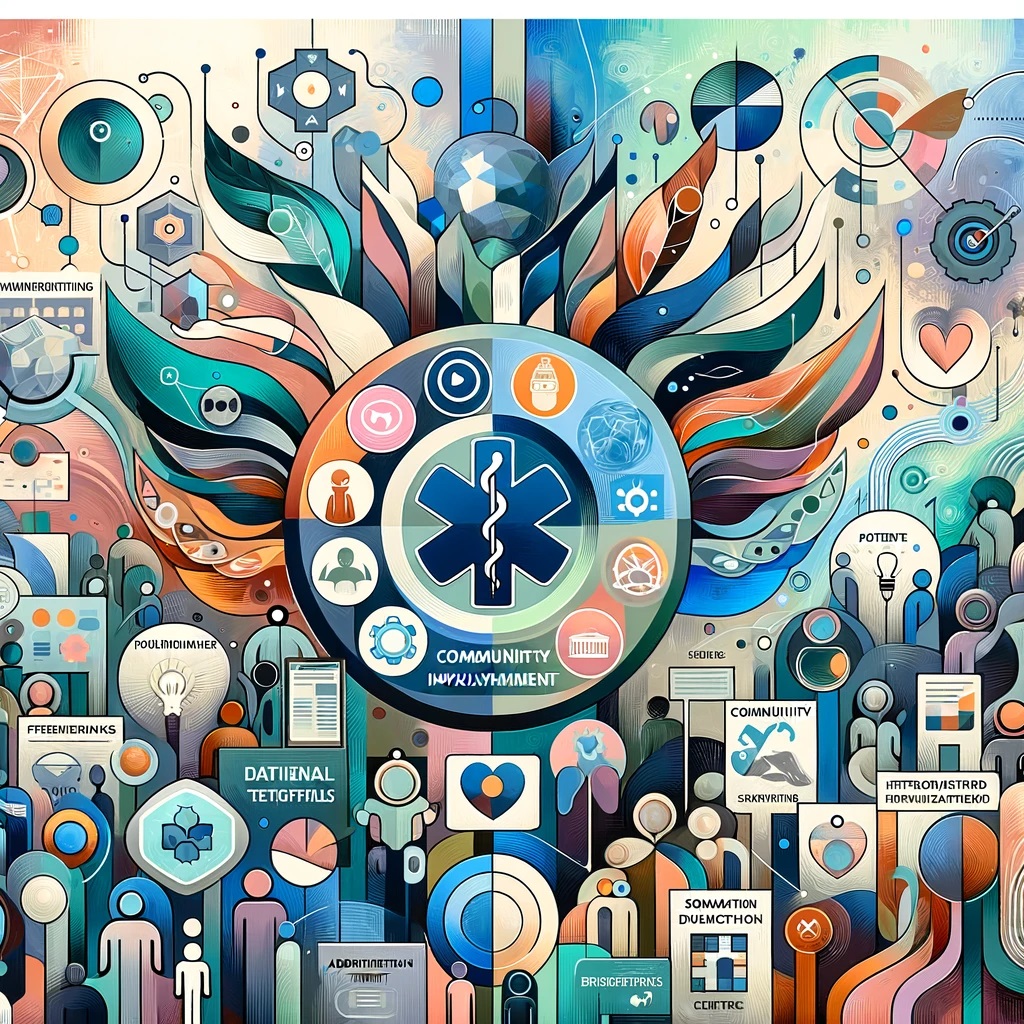Table of Contents
Targeted Marketing for Addiction Treatment
Introduction: The Critical Role of Marketing in Addiction Treatment Success
Understanding the Intersection of Marketing and Addiction Recovery
In the specialized field of targeted marketing for addiction treatment, marketing transcends traditional boundaries, becoming a vital link between individuals grappling with addiction and the transformative care they need. Here’s how we approach this unique intersection:
- Empathetic Messaging: Crafting marketing messages that are not only informative but also resonate with empathy and understanding, acknowledging the challenges faced by those struggling with addiction.
- Effective Channel Utilization: Identifying and leveraging the most effective channels to reach individuals in need, whether it’s through digital platforms, community outreach, or traditional media.
- Breaking Through Barriers: Developing strategies that cut through the clutter, reaching individuals who might be hesitant or unsure about seeking help.
The Power of Tailored Strategies in Reaching Those in Need
In addiction treatment marketing, personalization is key:
- Audience Segmentation: Segmenting the target audience based on factors like demographics, behavior, and stage of addiction, to deliver more relevant and impactful messages.
- Customized Content: Creating content that speaks directly to the unique experiences and needs of different audience segments, fostering a deeper connection.
- Trust-Building Through Relevance: Using tailored strategies to build trust with potential clients, showing them that your facility understands their specific journey and can provide the help they need.
Leveraging Digital Marketing in Addiction Treatment
Digital marketing offers powerful tools for reaching and engaging with individuals seeking addiction treatment:
- SEO for Targeted Visibility: Implementing substance abuse treatment SEO strategies to ensure your facility appears in search results for relevant queries.
- Personalized PPC Campaigns: Running addiction treatment PPC campaigns that target specific keywords and demographics, ensuring your ads reach those most likely to benefit from your services.
- Social Media Engagement: Utilizing social media platforms to create a supportive community, share success stories, and provide valuable information about addiction and recovery.
Measuring Success and Refining Strategies
To ensure the effectiveness of your marketing efforts:
- Data-Driven Decisions: Using marketing analytics to track the performance of your campaigns and make data-driven decisions.
- Continuous Strategy Refinement: Regularly reviewing and refining your marketing strategies based on performance data and changing market dynamics.
- Feedback Integration: Incorporating feedback from clients and community members to continually improve your marketing approach.
In conclusion, the role of marketing in addiction treatment success is multifaceted and crucial. By embracing targeted marketing strategies, leveraging digital marketing tools, and continuously refining approaches based on data and feedback, rehab centers can effectively connect with those in need, guiding them towards recovery and a better future.
Connect with us today to elevate your marketing strategy and make a lasting impact in the world of addiction recovery.
Contact us now!Foundational Elements of Addiction Treatment Marketing
Defining Your Target Audience: The Importance of Segmentation
Understanding your audience is pivotal. Here’s how segmentation enhances your marketing strategy:
- Demographic and Psychographic Analysis: Segmenting potential clients based on age, gender, location, and also their emotional and psychological profiles.
- Tailored Communication: Crafting messages that resonate with each segment, acknowledging their unique challenges and needs.
- Data-Driven Insights: Using data to refine your understanding of the target audience, ensuring your marketing efforts are well-directed and effective.
Behavioral Health Targeted Marketing: A Closer Look
Targeted marketing in behavioral health requires a nuanced approach:
- Behavior-Specific Campaigns: Creating campaigns that directly address the behaviors and challenges associated with addiction.
- Stage of Readiness Recognition: Tailoring marketing efforts to align with the potential client’s readiness for change.
- Solution-Oriented Messaging: Offering clear, solution-focused messages that encourage steps towards recovery.
Personalized Addiction Treatment Advertising: The New Standard
Personalization is the key in addiction treatment advertising:
- Individual Journey Acknowledgment: Crafting messages that recognize and respect each individual’s unique journey towards recovery.
- Engagement and Trust Building: Using personalized messaging to build trust and encourage engagement.
- Emotional Resonance: Ensuring your advertising strikes an emotional chord, increasing its impact and effectiveness.
Crafting Your Message: Personalized Marketing for Rehab
The messaging in rehab marketing must be carefully crafted:
- Sensitive and Hopeful Tone: Balancing a tone that is both sensitive to the client’s situation and hopeful about recovery.
- Pain Point Addressing: Directly speaking to the pain points and challenges faced by your audience.
- Clear Path to Recovery: Presenting a clear and attainable path to recovery in your messaging.
Emotional Targeting in Addiction Treatment Advertising
Emotional targeting can significantly enhance the effectiveness of your advertising:
- Empathy and Understanding: Creating messages that demonstrate empathy and understanding towards the struggles faced by individuals.
- Barrier Breaking: Using emotional targeting to break down barriers and foster a connection with your audience.
- Motivational Messaging: Crafting messages that motivate and inspire action towards seeking help.
Tailored Marketing Messages for Addiction Services
Tailoring your marketing messages is crucial for connecting with your audience:
- Personalized Approach: Developing messages that address the specific experiences and needs of different audience segments.
- Encouraging Action: Ensuring that your tailored messages encourage the necessary steps towards seeking treatment and support.
In conclusion, the foundational elements of addiction treatment marketing revolve around audience segmentation, behavioral health targeted marketing, personalized advertising, carefully crafted messaging, emotional targeting, and tailored marketing messages. By focusing on these key aspects, rehab centers can create effective, empathetic, and impactful marketing strategies that resonate with their audience and encourage steps towards recovery.

Uncover advanced strategies today!
Let’s make a difference!Leveraging SEO and SEM for Enhanced Visibility
Substance Abuse Treatment SEO: Strategies for Organic Growth
SEO is an invaluable asset. Here’s how it propels organic growth:
- Keyword Optimization: Integrating relevant keywords into your website’s content to improve visibility in search engine results.
- Content Value: Creating informative and helpful resources that address the needs and questions of those seeking addiction treatment.
- Continuous SEO Monitoring: Regularly updating and refining SEO strategies to keep up with search engine algorithm changes and industry trends.
Local SEO for Addiction Services: Capturing Community Attention
Local SEO is crucial for treatment centers focusing on their community:
- Google My Business Optimization: Ensuring your Google My Business listing is accurate and comprehensive, enhancing local search visibility.
- Local Keywords Strategy: Incorporating local keywords into your website’s content to attract a nearby audience.
- Community Engagement: Engaging with local community events and platforms to boost local presence and relevance.
SEO for Drug Treatment Facilities: Best Practices
Effective SEO for drug treatment facilities involves several best practices:
- Technical SEO: Ensuring your website is technically optimized for search engines, including mobile optimization and fast loading times.
- Quality Content Creation: Developing high-quality, informative content that positions your facility as a trusted authority.
- Backlink Strategy: Building authoritative backlinks to enhance your website’s credibility and search ranking.
SEM for Addiction Treatment: Navigating Paid Search
SEM complements SEO by providing immediate visibility:
- Targeted Paid Campaigns: Using paid search strategies to quickly reach potential clients when they are actively seeking help.
- Ad Copy Effectiveness: Crafting compelling ad copy that resonates with the target audience and encourages clicks.
- Budget Management: Efficiently managing your SEM budget to maximize impact and reach.
Addiction Treatment PPC Campaigns: Maximizing ROI
PPC campaigns are a key component of SEM:
- Specific Keyword Targeting: Focusing on keywords that are most relevant to your treatment services and audience.
- Conversion Tracking: Monitoring campaign performance and adjusting strategies to improve conversion rates and ROI.
- Audience Segmentation: Tailoring PPC campaigns to different audience segments for more personalized and effective advertising.
SEM Strategies for Addiction Recovery: Advanced Techniques
Advanced SEM strategies require a deep understanding of the digital landscape:
- Comprehensive Keyword Research: Conducting thorough keyword research to identify opportunities and gaps in the market.
- Conversion-Focused Ad Copywriting: Writing ad copy that is not only compelling but also optimized for conversions.
- Data-Driven Optimization: Continuously analyzing campaign data to refine and improve SEM strategies for better results.
In conclusion, leveraging SEO and SEM for enhanced visibility in addiction treatment marketing involves a strategic blend of organic and paid search strategies. By focusing on local SEO, best practices for drug treatment facility SEO, effective SEM campaigns, and advanced PPC techniques, rehab centers can significantly increase their online presence, reaching and engaging more effectively with their target audience.

Digital Marketing Tactics for Rehab Centers
Addiction Therapy Digital Marketing: Engaging Online Audiences
Digital marketing is essential for engaging with online audiences. Here’s how we approach this:
- Diverse Digital Platforms: Utilizing a range of digital platforms, from social media to email campaigns, to reach and engage with your audience.
- Engaging and Interactive Content: Creating content that is not only informative but also interactive, encouraging participation and engagement.
- Consistent Online Presence: Maintaining a consistent and active online presence to build and sustain audience engagement.
Online Marketing for Detox Centers: Unique Challenges and Opportunities
Detox centers face distinct marketing challenges:
- Addressing Immediate Needs: Tailoring marketing strategies to address the urgent needs of potential clients and their families.
- Critical Moment Engagement: Developing tactics to engage with individuals during crucial decision-making moments.
- Compassionate Messaging: Ensuring all marketing communications are empathetic and understanding of the sensitive nature of detox services.
Digital Marketing Strategies for Substance Abuse Treatment: A Holistic Approach
A holistic digital marketing approach is key for substance abuse treatment:
- Client Journey Integration: Integrating various digital tactics to support the entire client journey, from awareness to decision-making.
- Cohesive Online Environment: Creating a supportive and cohesive online environment that nurtures leads and encourages them to seek help.
- Multi-Channel Strategy: Employing a multi-channel strategy to reach potential clients across different digital platforms.
Content Marketing for Drug Rehabilitation: Building Authority
Content marketing is crucial for establishing authority:
- Valuable and Informative Content: Providing content that is both valuable and informative, positioning your center as a reliable source of information.
- Thought Leadership: Establishing your center as a thought leader in the addiction treatment field through insightful and authoritative content.
- Regular Content Updates: Keeping your content fresh and updated to maintain engagement and authority.
Targeted Content for Addiction Recovery: Meeting User Intent
Creating content that meets user intent is essential:
- User-Focused Content: Developing content that directly addresses the questions and concerns of those seeking addiction recovery.
- Engagement and Conversion: Crafting content that not only engages users but also encourages them to take the next step towards recovery.
- Diverse Content Formats: Utilizing various content formats, such as blog posts, videos, and infographics, to cater to different user preferences.
Addiction Treatment SERP Strategies: Dominating Search Results
Dominating SERPs requires strategic efforts:
- Comprehensive Content Creation: Creating content that comprehensively answers common queries related to addiction treatment.
- Featured Snippet Optimization: Optimizing content to appear in featured snippets, enhancing visibility in search results.
- Active Online Engagement: Maintaining an active and responsive online presence to boost search engine rankings.
In conclusion, leveraging digital marketing tactics for rehab centers involves a combination of engaging online audiences, addressing the unique challenges of detox centers, employing holistic digital strategies for substance abuse treatment, building authority through content marketing, creating targeted content for addiction recovery, and implementing strategic SERP tactics. By focusing on these key areas, rehab centers can effectively enhance their digital presence and connect with those in need of their services.

Explore it with us!
Take the first step now!Targeted Advertising and Promotion Techniques
Targeted Advertising for Rehab Centers: Reaching the Right People
Precision in advertising is key. Here’s how targeted advertising makes a difference:
- Data-Driven Targeting: Utilizing data and analytics to identify and reach the most relevant audience for your services.
- Message Precision: Crafting messages that resonate with the specific needs and circumstances of your target audience.
- Efficient Resource Allocation: Focusing your advertising budget on strategies that are most likely to reach and engage the right people.
Addiction Treatment Center Ad Targeting: The Science of Precision
Ad targeting in addiction treatment involves a scientific approach:
- Behavioral and Demographic Analysis: Understanding the behavioral patterns and demographic profiles of potential clients to inform ad targeting.
- Data-Leveraged Campaigns: Using data to create more effective and impactful advertising campaigns.
- Continuous Optimization: Regularly refining targeting strategies based on campaign performance and audience feedback.
Addiction Treatment Audience Segmentation: A Deep Dive
Effective audience segmentation is crucial for personalized advertising:
- Beyond Basic Demographics: Including behavioral tendencies, psychographics, and readiness for treatment in your segmentation criteria.
- Insight-Driven Strategies: Gaining deep insights into each segment to develop more personalized and successful advertising strategies.
- Tailored Messaging: Creating messages that speak directly to the unique needs and motivations of each audience segment.
Addiction Recovery Program Promotion: Effective Campaigns
Promoting addiction recovery programs requires strategic planning:
- Strategic Messaging and Targeting: Combining strategic messaging with targeted advertising to reach potential clients effectively.
- Campaign Optimization: Continuously optimizing campaigns for better reach, engagement, and conversion rates.
- Multi-Channel Approach: Utilizing a variety of channels to ensure a wide yet targeted reach.
Drug Rehabilitation Marketing Plans: A Structured Approach
A structured approach is essential for effective drug rehabilitation marketing:
- Clear Objectives and Audience Targeting: Outlining specific objectives and identifying target audiences for your marketing efforts.
- Tactical Planning: Detailing the tactics and channels to be used in your marketing plan.
- Performance Measurement: Establishing key performance indicators (KPIs) to measure the success and impact of your marketing efforts.
Holistic Marketing for Addiction Recovery: Integrating Diverse Tactics
A holistic marketing approach integrates various tactics for a comprehensive campaign:
- Unified Campaign Strategy: Ensuring all marketing efforts are aligned and work cohesively towards the common goal of aiding recovery.
- Diverse Promotional Tactics: Combining different promotional tactics, from digital advertising to content marketing, for a well-rounded approach.
- Consistent Brand Messaging: Maintaining consistent messaging across all platforms to reinforce your brand and its mission.
In conclusion, targeted advertising and promotion techniques in addiction treatment marketing involve precise audience targeting, in-depth audience segmentation, effective program promotion strategies, structured marketing planning, and a holistic approach to integrating diverse tactics. By focusing on these key areas, rehab centers can effectively reach and engage their target audience, ultimately guiding more individuals towards recovery.
Talk to us!
Get our help today!Conversion Optimization and Lead Generation
Conversion Optimization for Treatment Centers: Turning Visitors into Patients
Conversion optimization is crucial. Here’s how it’s done:
- Website and Online Presence Refinement: Enhancing your website and online platforms to make them more conducive to conversions.
- Creating a Motivating User Experience: Developing a website experience that is not only informative but also encourages visitors to take action.
- Clear Calls-to-Action: Implementing clear and compelling calls-to-action that guide visitors towards contacting your center or signing up for a program.
Personalized Marketing for Rehab: Enhancing Patient Experience
Personalization is key in rehab marketing:
- Customized Website Content: Tailoring website content to address the specific needs and concerns of your visitors.
- Targeted Follow-Up Communications: Sending personalized follow-up emails and messages that resonate with potential patients.
- Building a Connection: Using personalization to create a sense of understanding and care, which is essential in converting leads into patients.
Behavioral Targeting for Treatment Facilities: Converting Interest into Action
Behavioral targeting is a powerful tool for conversion:
- Data-Driven Marketing Messages: Utilizing user behavior data to deliver marketing messages that are more likely to lead to conversion.
- Timely and Relevant Messaging: Presenting the right message at the right time to encourage individuals to take the next step in their recovery journey.
- Understanding User Intent: Tailoring your marketing efforts to align with the intentions and interests of your audience.
Lead Generation for Treatment Programs: The Lifeline of Rehab Centers
Lead generation is vital for the growth of rehab centers:
- Diverse Digital Marketing Tactics: Employing a variety of digital marketing tactics to attract individuals seeking help.
- Capturing Information for Follow-Up: Implementing strategies to capture contact information of potential clients for further engagement.
- Continuous Lead Nurturing: Actively nurturing leads through the decision-making process to encourage them to choose your center.
Keyword Targeting for Rehab Services: Attracting Qualified Leads
Targeted keywords are essential in attracting the right audience:
- Relevant Keyword Selection: Choosing keywords that are closely related to the services offered by your rehab center.
- Attracting High-Intent Visitors: Focusing on keywords that are used by individuals actively seeking rehab services.
- Content Optimization: Optimizing your website’s content with these keywords to improve visibility and attract qualified leads.
Marketing Analytics for Addiction Services: Measuring Success
Analytics is crucial in measuring the success of your marketing efforts:
- Tracking Key Performance Indicators: Monitoring metrics such as conversion rates, website traffic, and lead quality.
- Data-Driven Decision Making: Using insights from analytics to inform and adjust your marketing strategies.
- Continuous Improvement: Regularly analyzing performance data to identify areas for improvement and optimize strategies for better results.
In conclusion, conversion optimization and lead generation in addiction treatment marketing involve refining online platforms for better conversions, employing personalized marketing, utilizing behavioral targeting, generating and nurturing leads, targeting the right keywords, and leveraging analytics to measure success. By focusing on these strategies, rehab centers can effectively turn visitors into patients and sustain their growth and impact in the addiction treatment field.

Discover emerging trends!
Get our help today!Best Practices and Emerging Trends in Addiction Marketing
Rehab Center Marketing Best Practices: Lessons from the Field
In the evolving landscape of targeted marketing for addiction treatment, adopting best practices is crucial. Here’s how rehab centers can enhance their marketing:
- Understanding the Customer Journey: Mapping out the customer journey to create targeted marketing strategies at each stage.
- Creating Relatable Content: Developing content that resonates with the experiences and needs of your target audience.
- Strong Online Presence: Maintaining a robust and engaging online presence across various digital platforms.
Addiction Treatment Agency SEO: Partnering for Success
Collaborating with a specialized SEO agency offers significant benefits:
- Expertise in SEO: Gaining access to specialized knowledge and skills in search engine optimization.
- Tailored SEO Strategies: Developing customized SEO strategies that align with the specific needs of your rehab center.
- Ongoing Support and Optimization: Receiving continuous support to ensure your online presence remains optimized and effective.
Rehab Marketing Keyword Research: Uncovering Opportunities
Effective keyword research is foundational in addiction treatment marketing:
- Identifying Relevant Keywords: Discovering the terms and phrases potential clients use when seeking addiction treatment services.
- Content and Advertising Alignment: Aligning your content and advertising efforts with these identified keywords to meet audience needs.
- Opportunity Exploration: Exploring new keyword opportunities to stay ahead in the competitive landscape.
Innovative Strategies in Addiction Services Marketing
Innovation is key to differentiating your rehab center:
- Embracing Digital Marketing Trends: Staying updated with the latest trends and technologies in digital marketing.
- Experimenting with New Platforms: Trying out new platforms and marketing channels to reach your audience in innovative ways.
- Data-Driven Refinement: Continually refining your marketing approach based on data analysis and audience feedback.
User Intent Marketing for Rehab: Aligning with Patient Needs
Aligning marketing with user intent ensures relevance and effectiveness:
- Content That Addresses User Needs: Creating content and campaigns that directly respond to the queries and concerns of your target audience.
- Relevance and Effectiveness: Ensuring your marketing efforts meet the specific needs of those seeking addiction treatment.
- Strategic Content Placement: Placing content strategically across digital platforms to align with user search intent.
Addiction Treatment Niche Targeting: Specializing for Impact
Niche targeting can significantly enhance the impact of your marketing:
- Focus on Specialized Audiences: Tailoring marketing messages to resonate with specific segments within the addiction treatment field.
- Differentiation from Competitors: Standing out by specializing in particular areas of addiction treatment.
- Tailored Marketing Strategies: Developing marketing strategies that specifically address the needs of your niche audience.
In conclusion, best practices and emerging trends in addiction marketing involve a blend of adopting proven marketing strategies, partnering with SEO experts, conducting thorough keyword research, innovating in marketing approaches, aligning with user intent, and targeting niche areas in addiction treatment. By focusing on these key areas, rehab centers can effectively enhance their marketing efforts, reaching and engaging more effectively with their target audience.
Let’s discuss the next steps!
Get our help today!Conclusion: Integrating Strategies for Comprehensive Marketing Success
The Future of Addiction Treatment Marketing: Adapting to Change
In the dynamic world of targeted marketing for addiction treatment, adaptability is crucial. Here’s how rehab centers can navigate this evolving landscape:
- Responsive to Consumer Behavior: Staying attuned to changes in consumer behavior and preferences, and adjusting marketing strategies accordingly.
- Embracing Technological Advances: Keeping pace with the latest technological advancements and integrating them into your marketing efforts.
- Compliance with Industry Regulations: Continuously updating your marketing practices to comply with evolving industry regulations and standards.
Driving Real Impact: Next Steps for Treatment Centers in Marketing
For treatment centers to drive real impact, a strategic and integrated approach is essential:
- Holistic Marketing Integration: Combining various marketing tactics, from digital advertising to content marketing, to create a comprehensive strategy.
- Data-Driven Improvements: Utilizing analytics to continuously assess and improve the effectiveness of marketing campaigns.
- Client-Centric Campaigns: Ensuring that the client’s needs and experiences are central to every marketing initiative.
Embracing Innovation in Marketing
Innovation is key to staying ahead in addiction treatment marketing:
- Exploring New Marketing Channels: Venturing into new digital platforms and marketing channels to reach a broader audience.
- Creative Campaigns: Developing creative and innovative marketing campaigns that stand out and resonate with your target audience.
- Leveraging Emerging Technologies: Utilizing emerging technologies like AI and VR to enhance marketing efforts and client engagement.
Personalization and Relationship Building
Personalization and relationship building are fundamental for long-term success:
- Tailored Marketing Messages: Creating marketing messages that are personalized to the needs and preferences of your target audience.
- Building Trust with Clients: Establishing trust through consistent, honest, and empathetic communication.
- Fostering Long-Term Relationships: Developing strategies aimed at building and maintaining long-term relationships with clients, beyond the initial treatment phase.
Conclusion
In conclusion, integrating various strategies for comprehensive marketing success in the field of addiction treatment requires a blend of adaptability, strategic planning, innovation, personalization, and relationship building. By focusing on these key areas, rehab centers can effectively navigate the ever-changing landscape of addiction treatment marketing, driving real impact and helping more individuals on their journey to recovery.
Questions You Might Ponder
What are the key elements of a successful addiction treatment marketing strategy?
A successful addiction treatment marketing strategy should be empathetic and tailored to the unique needs of the target audience. Key elements include:
1. Defining and understanding the target audience through segmentation.
2. Crafting personalized and emotionally resonant messages.
3. Leveraging SEO and SEM for increased online visibility.
4. Implementing a variety of digital marketing tactics, including content marketing.
5. Utilizing targeted advertising and promotion techniques.
6. Focusing on conversion optimization and lead generation.
7. Keeping up with best practices and emerging trends in the field.
Each of these elements works in concert to create a comprehensive approach that connects with individuals in need and guides them toward recovery.
How can addiction treatment centers improve their online visibility?
Addiction treatment centers can improve online visibility by:
1. Optimizing their website and content for search engines (SEO).
2. Engaging in pay-per-click (PPC) advertising campaigns (SEM).
3. Creating valuable, informative content that addresses user intent.
4. Maintaining an active and engaging presence on social media platforms.
5. Encouraging reviews and testimonials to enhance local SEO.
6. Partnering with an SEO agency that specializes in the behavioral health field.
By focusing on these tactics, treatment centers can enhance their digital footprint and become more accessible to those searching for addiction recovery services.
What role does personalized marketing play in addiction treatment advertising?
Personalized marketing plays a crucial role in addiction treatment advertising as it:
1. Addresses the individual needs and circumstances of the target audience.
2. Builds trust and rapport with potential clients by showing understanding and empathy.
3. Increases engagement by resonating with the audience on a personal level.
4. Enhances the user experience on digital platforms, making it more likely for visitors to take action.
5. Encourages a sense of community and support, which is vital for individuals seeking help.
Personalized marketing strategies ensure that the messaging is not only seen but also felt, leading to higher conversion rates and more successful outcomes.
Ready to make a difference in the lives of those seeking recovery? Reach out to us today!

